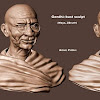After joining the Congress, the rise of Bose to the top was phenomenal. He went to Calcutta under the mentor ship of C.R.Das and became a very prominent figure in the city. His political rise was alarming to such an extent that the British Criminal Investigation Department started keeping tabs on him (he was the youngest politician to have this "honor"). He was selected to be the Youth Congress president, imprisoned, was released and by 1927, he was one of the General Secretaries of Congress. It was during these years that the relationship between Jawaharlal Nehru and Bose was cemented as well. This aspect of the relationship between the Gandhi and Bose is important. Nehru was attributed with the below remark about Indian Civil Service:
Indian Civil Service with which we are unfortunately still afflicted in this country, is neither Indian, nor civil, nor a service
This remark is one of the factors which made Bose to quit the ICS and join Gandhi and Congress in the first place.
The first crack in the relationship between Gandhi and Bose appeared when all the leaders were seated with the Simon Commission ('27). While others were discussing a dominion status for India, Bose famously shouted :
Bharat shall be free, the only question is when
A section of the Congress identified with the strong response of Bose, while a faction preferred to work with the existing government from the inside. This provoked a rare public display of anger from the Mahatma. After this incident, there are many ambivalent statements by both Gandhi and Bose, though they criticized the methods and not the person. The fact that Bose was inspired by Bal Gangadhar Tilak (radical) and Gandhiji was into the tradition of Gopal Krishna Gokhale (moderate) became much clearer at this point of time. Nehru and Bose worked closely during these years. They were both socialistic, where as Rajaji, Rajendra Prasad and Sardar Patel were right wing. Between Bose and Nehru, Congress stayed as a political body with a socialism agenda as they held (or some one close to them held) the post of Congress president. The right wing of the Congress had no chance against the combined influence of Nehru and Bose.
It was in 1927 that Bose passed the "Purna Swaraj" resolution, but it was easily defeated by the others in 1928 (it was adopted in a different form in 1942 however). Gandhi tactfully elected Nehru president after this in '29. The Dandi Salt March of 1930 was praised by Bose, drawing parallels and comparing it with Napoleon's march on Paris. He said that just like the march of Napoleon, Gandhi's march would change the course of history, which is exactly what happened t is said that Subhas Chandra Bose landed in Bombay (July 1921), and promptly went to meet Gandhi the same day. Thus the great tale of the two legendary sons of India begins, which unfolded over the next twenty five years setting the course of history of our country.
Courtesy: Quora.com












No comments:
Post a Comment